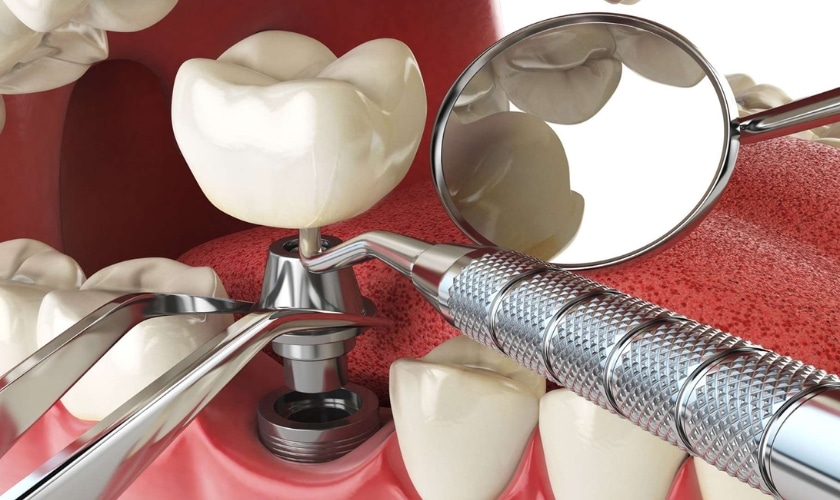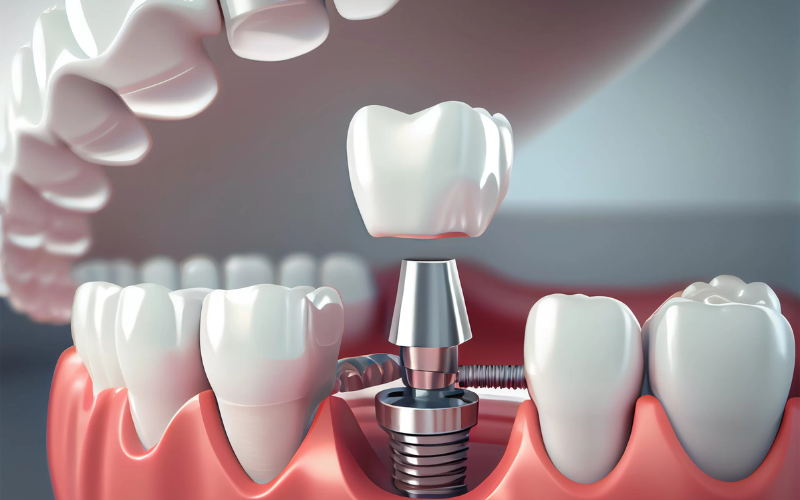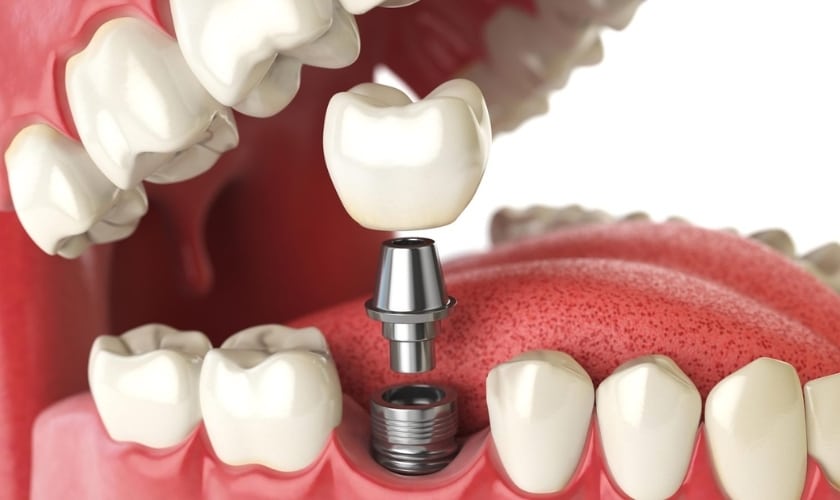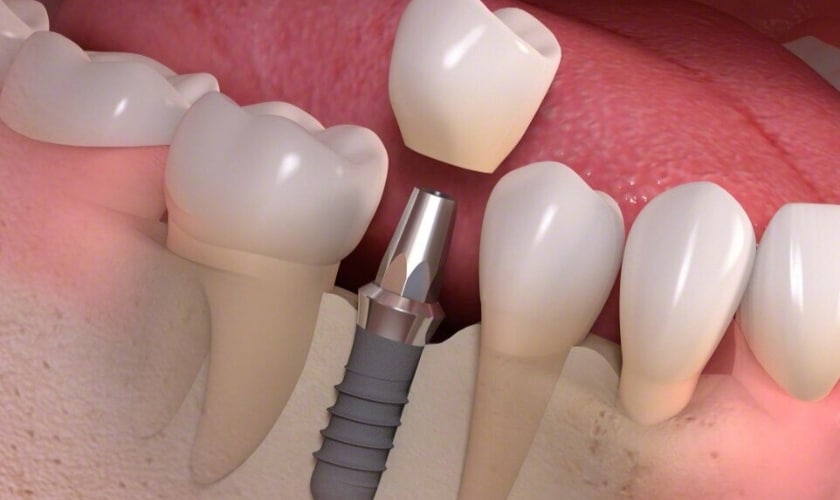
A complete, healthy smile is essential for both oral health and overall well-being. But missing teeth can be a source of embarrassment, functional problems, and even impact your self-esteem.
Fortunately, modern dentistry offers a revolutionary solution for missing teeth: dental implants. These tiny biocompatible titanium posts are surgically placed in your jawbone, acting as artificial tooth roots. They provide a strong foundation for supporting crowns, bridges, or dentures, restoring both the aesthetics and functionality of your smile.
This blog delves into the world of dental implants, exploring their numerous benefits, the different types available, the treatment process, and how to determine if they're the perfect solution for your missing teeth.
The Downside of Missing Teeth: More Than Just a Cosmetic Concern
Missing teeth can have a significant impact on your life beyond aesthetics. Here are some of the consequences of missing teeth:
-
Chewing Difficulties: Missing teeth can make it challenging to chew food properly, leading to digestive problems and nutritional deficiencies.
-
Speech Impediments: Gaps left by missing teeth can affect speech patterns, causing slurring or difficulty pronouncing certain sounds.
-
Bone Loss: When teeth are missing, the jawbone beneath them begins to deteriorate due to lack of stimulation. This can lead to facial collapse and a sunken appearance over time.
-
Shifting Teeth: The remaining teeth may shift to fill the gaps left by missing teeth, causing misalignment and bite problems.
-
Reduced Confidence: Missing teeth can lead to feelings of self-consciousness and negatively impact your social life and self-esteem.
Traditional solutions for missing teeth, like dentures and bridges, can offer some benefits, but they come with limitations. Dentures can become loose and uncomfortable, while bridges require modification of healthy teeth for support. Here's where dental implants offer a superior and more permanent option.
The Advantages of Dental Implants: A Revolution in Tooth Replacement
Dental implants offer a plethora of benefits that make them the preferred solution for missing teeth:
-
Natural Look and Feel: Implants fuse with your jawbone, providing a stable and secure foundation for your replacement tooth (crown, bridge, or denture). This results in a natural-looking and feeling restoration that mimics the function of a natural tooth.
-
Improved Functionality: Dental implants allow you to chew all types of food with confidence and comfort, restoring your natural bite and improving your digestive health.
-
Speech Enhancement: Implants prevent speech impediments caused by missing teeth, ensuring clear and confident communication.
-
Bone Preservation: By stimulating the jawbone, implants prevent bone loss and maintain your facial structure.
-
Durability and Longevity: Dental implants are incredibly durable and can last a lifetime with proper care. They are a long-term investment in your oral health and smile.
-
Improved Self-Confidence: A complete and healthy smile can significantly boost your confidence and self-esteem, allowing you to smile freely and enjoy your social interactions.
Exploring the Types of Dental Implants: Options for Every Need
Dental implants come in various types to address different needs and situations. Here's a breakdown of the most common types:
-
Endosteal Implants: These are the most common type of implant. They are surgically placed directly into the jawbone and are ideal for replacing single or multiple missing teeth.
-
Subperiosteal Implants: These implants are placed on or above the jawbone and are typically used for patients with insufficient jawbone volume.
-
Zygomatic Implants: These specialized implants are used in the upper jawbone, typically for patients with severe bone loss in the sinuses.
Your dentist will recommend the most suitable type of implant based on your specific needs and jawbone health.
The Dental Implant Journey: A Step-by-Step Guide
The dental implant process typically involves several stages:
-
Initial Consultation: During the consultation, your dentist will assess your oral health, discuss your goals, and determine if you're a good candidate for implants.
-
X-rays and Scans: X-rays or CT scans will be taken to evaluate your jawbone structure and plan the implant placement.
-
Dental Implant Placement Surgery: The implant surgery is usually performed under local anesthesia or IV sedation. The dentist will make a small incision in the gum tissue and surgically place the implant post into the jawbone. The area will then be stitched closed, and a temporary restoration may be placed.
-
Healing Period: Following surgery, your jawbone will need time to heal and fuse with the implant (osseointegration). This healing period can take several months.
-
Abutment Placement: Once the implant is fully integrated, your dentist will place a small connector piece (abutment) on top of the implant. This abutment will serve as the base for your new tooth restoration.
-
Crown, Bridge, or Denture Placement: The final stage involves attaching the permanent restoration to the abutment. This could be a crown for a single tooth, a bridge for several missing teeth, or an implant-supported denture for a full arch of missing teeth.
The entire treatment process can take several months, depending on the complexity of the case and your individual healing time.
Are Dental Implants Right for You? Factors to Consider
Dental implants are a fantastic option for many people with missing teeth. However, some factors can influence whether they are the right choice for you. Here are some key considerations:
-
Overall Health: You should be in good overall health and free of any uncontrolled medical conditions that could affect healing.
-
Jawbone Health: Sufficient jawbone volume is crucial for successful implant placement. If you have bone loss, bone grafting procedures may be necessary before implant surgery.
-
Smoking: Smoking can hinder the healing process and increase the risk of implant failure. Quitting smoking is recommended before and after implant surgery.
-
Oral Hygiene: Maintaining good oral hygiene is essential for the long-term success of dental implants. You must be committed to brushing and flossing regularly.
-
Cost: Dental implants are an investment in your oral health. Discuss the cost with your dentist and explore financing options if needed.
Beyond the Surgery: Caring for Your Dental Implants for a Lifetime Smile
With proper care, dental implants can last a lifetime. Here's how to ensure their longevity:
-
Maintain Excellent Oral Hygiene: Brush twice daily and floss daily to remove plaque and bacteria buildup around the implants and abutments.
-
Regular Dental Checkups: Schedule regular dental checkups and cleanings with your dentist to monitor the health of your implants and gums.
-
Lifestyle Habits: Avoid habits like smoking or teeth clenching that can damage implants.
-
Diet: Maintain a healthy diet and avoid excessively hard or chewy foods that could put stress on the implants.
By following these tips and maintaining good oral hygiene habits, you can enjoy the benefits of your dental implants for years to come.
A Brighter, Healthier Smile Awaits: Embrace the Benefits of Dental Implants
Missing teeth can significantly impact your oral health, self-confidence, and overall well-being. Dental implants offer a permanent, natural-looking, and functional solution.
If you're considering replacing missing teeth, schedule a consultation with your dentist to discuss if dental implants are the right choice for you. With their numerous benefits and long-lasting results, dental implants can transform your smile and your life. Don't wait any longer to reclaim your confidence and enjoy the freedom of a complete and healthy smile!




